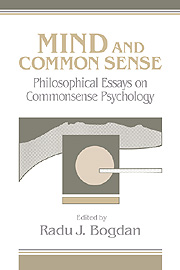Book contents
- Frontmatter
- Contents
- List of Contributors
- 1 The Folklore of the Mind
- 2 Analysis without Noise
- 3 Folk Psychology and the Explanation of Human Behavior
- 4 Methodological Reflections on Belief
- 5 Consciousness and Content
- 6 The Inevitability of Folk Psychology
- 7 How is Eliminative Materialism Possible?
- 8 The Long Past and the Short History
- 9 Common Sense Naturalized: The Practical Stance
- Index
4 - Methodological Reflections on Belief
Published online by Cambridge University Press: 24 September 2009
- Frontmatter
- Contents
- List of Contributors
- 1 The Folklore of the Mind
- 2 Analysis without Noise
- 3 Folk Psychology and the Explanation of Human Behavior
- 4 Methodological Reflections on Belief
- 5 Consciousness and Content
- 6 The Inevitability of Folk Psychology
- 7 How is Eliminative Materialism Possible?
- 8 The Long Past and the Short History
- 9 Common Sense Naturalized: The Practical Stance
- Index
Summary
Intentional Realism
Let's suppose there really are such things as pro positional attitudes. And let's understand this claim as Putnam (1975) would have us understand claims about natural kinds so that it could turn out that most of what we believe about the propositional attitudes might be mistaken in one way or another. Or, if that is going too far, let's at least understand the claim in such a way that any particular thing we believe about the attitudes might turn out to be false. This, it seems to me, is the way we have to understand the claim that there are such things as propositional attitudes if we are to take the claim to be an empirical one on all fours with such claims as that there are elephants, genes, or crystals. Otherwise, we can legislate against surprising empirical discoveries about the attitudes by claiming that the discoverers have merely changed the subject. “Computationalists can't be talking about belief,” we might say, “because beliefs are individuated, at least in part, by social factors, and computational states are not. At best, they are talking about ‘shmaliefs’, not beliefs.”
The trouble with this sort of move is that the philosopher who makes it runs the risk that he or she is talking about nothing at all.
- Type
- Chapter
- Information
- Mind and Common SensePhilosophical Essays on Common Sense Psychology, pp. 53 - 70Publisher: Cambridge University PressPrint publication year: 1991
- 3
- Cited by

